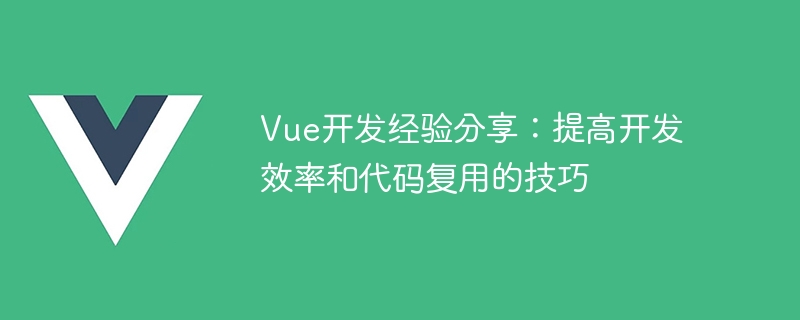Home >Web Front-end >Vue.js >Vue development experience sharing: Tips to improve development efficiency and code reuse
Vue development experience sharing: Tips to improve development efficiency and code reuse
- PHPzOriginal
- 2023-11-23 09:53:361181browse

Vue.js is a popular front-end framework that is widely used in various web development projects. Its simplicity and efficiency enable developers to build powerful applications faster. This article will share some Vue development experiences to help developers improve development efficiency and code reuse techniques.
In Vue development, there are several key aspects to pay attention to. The first is the division and organization of components. Good component division can clearly separate the application logic into different functional modules, and these modules can be reused. When designing components, follow the single responsibility principle, and each component is only responsible for a clear function. At the same time, components should try to remain independent and not rely on external state. This makes it easier to test and reuse components.
The second is to make reasonable use of the instructions and life cycle hooks provided by Vue. Vue provides a rich set of instructions and lifecycle hooks that can help us better control the behavior of components. For example, the v-if directive can dynamically render components based on conditions, the v-for directive can traverse an array or object to generate a list, and the mounted hook can perform some initialization operations after the component is mounted to the DOM. Understanding and flexibly using these instructions and hooks can improve the simplicity and readability of the code.
In addition, the rational use of calculated properties and listeners is also a way to improve development efficiency. A computed property is a property that dynamically calculates results based on dependencies. It can cache calculation results and improve performance. Listeners are used to observe changes in data and perform corresponding operations when they change. By rationally using computed properties and listeners, we can more easily handle changes in data and perform corresponding operations.
In addition, Vue also provides two advanced features: slots and mixins to enhance the flexibility and reusability of components. Slots are a mechanism that allows content distribution between components, inserting content from a parent component into a child component at a specific location. Mixing is a way to mix a set of options into a component, which can help us achieve code reuse and expansion. Proper use of slots and mixins can improve component configurability and scalability.
Finally, in order to improve development efficiency, we can also use some auxiliary tools and libraries. For example, Vue CLI is an official scaffolding tool that can help us quickly build Vue projects and integrates commonly used development tools and plug-ins. Axios is a popular HTTP request library that can help us make network requests more conveniently. Vuetify is a Vue-based UI component library that provides a rich set of UI components that can speed up our development process.
To sum up, the sharing of Vue development experience includes rational division and organization of components, flexible use of instructions and life cycle hooks, reasonable use of calculated properties and listeners, full use of slots and mixins, use of auxiliary tools and libraries, etc. By applying these techniques, we can improve development efficiency, reduce repetitive code writing, and build more maintainable and robust Vue applications. I hope these experiences can help developers who are learning or using Vue.
The above is the detailed content of Vue development experience sharing: Tips to improve development efficiency and code reuse. For more information, please follow other related articles on the PHP Chinese website!

